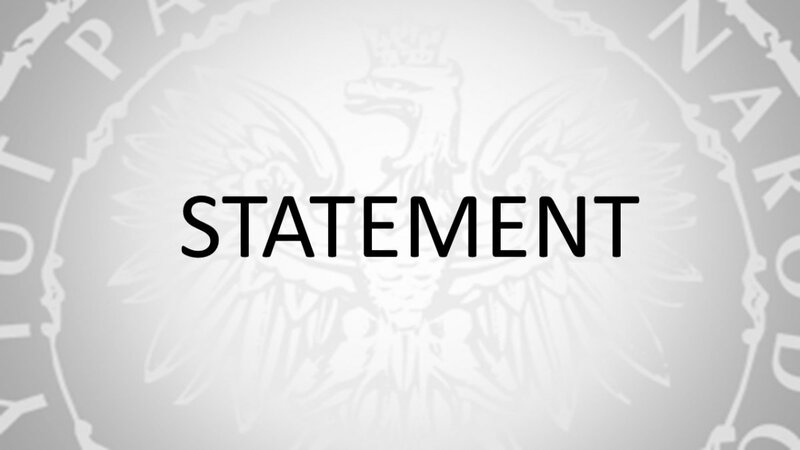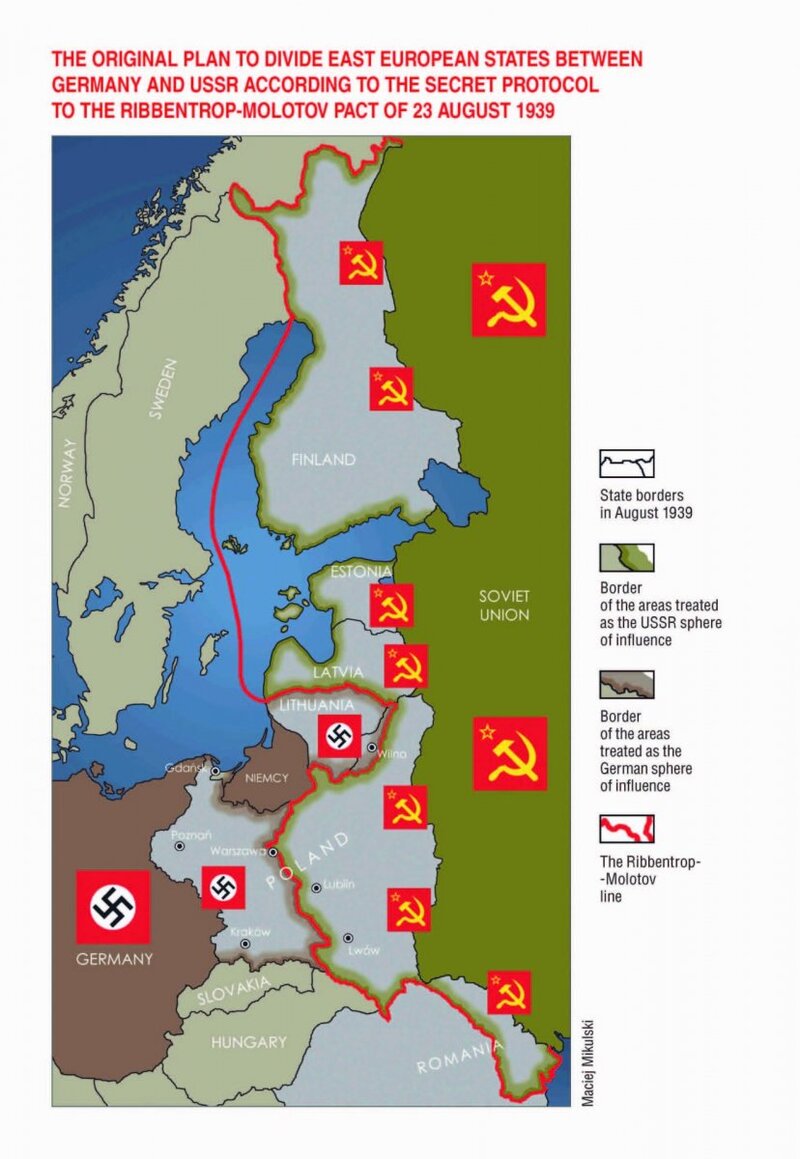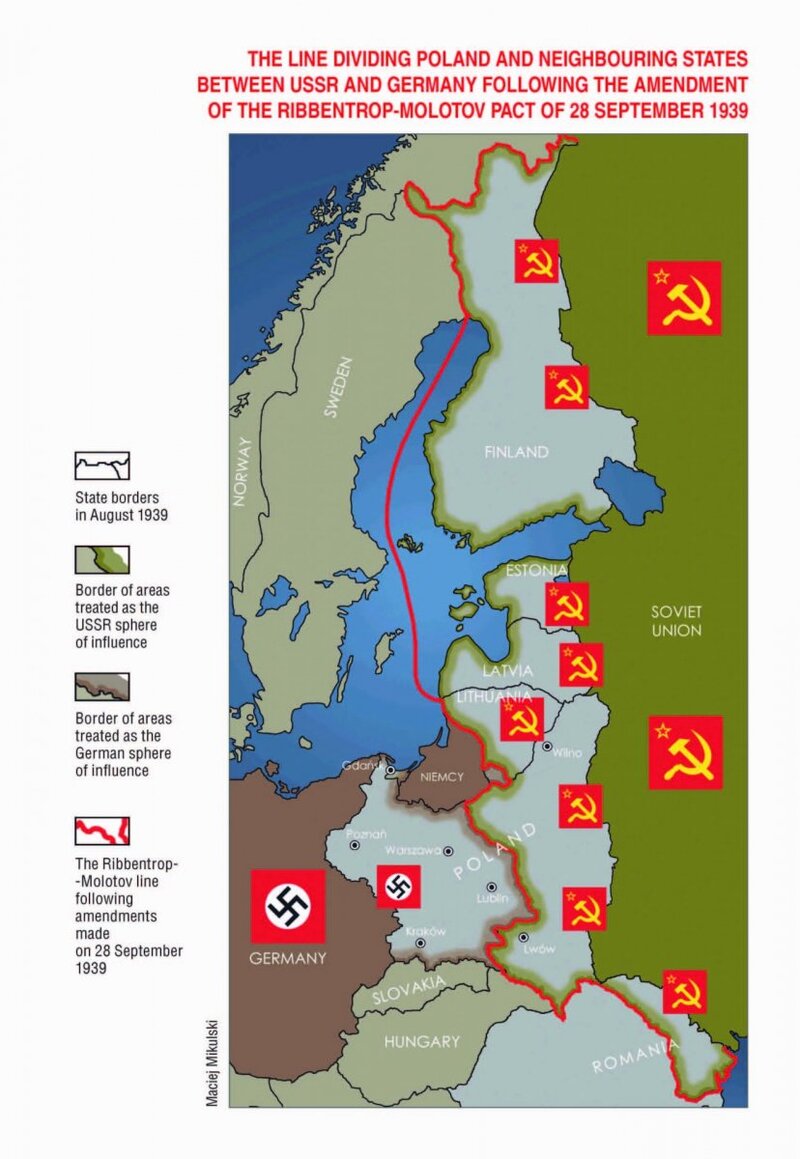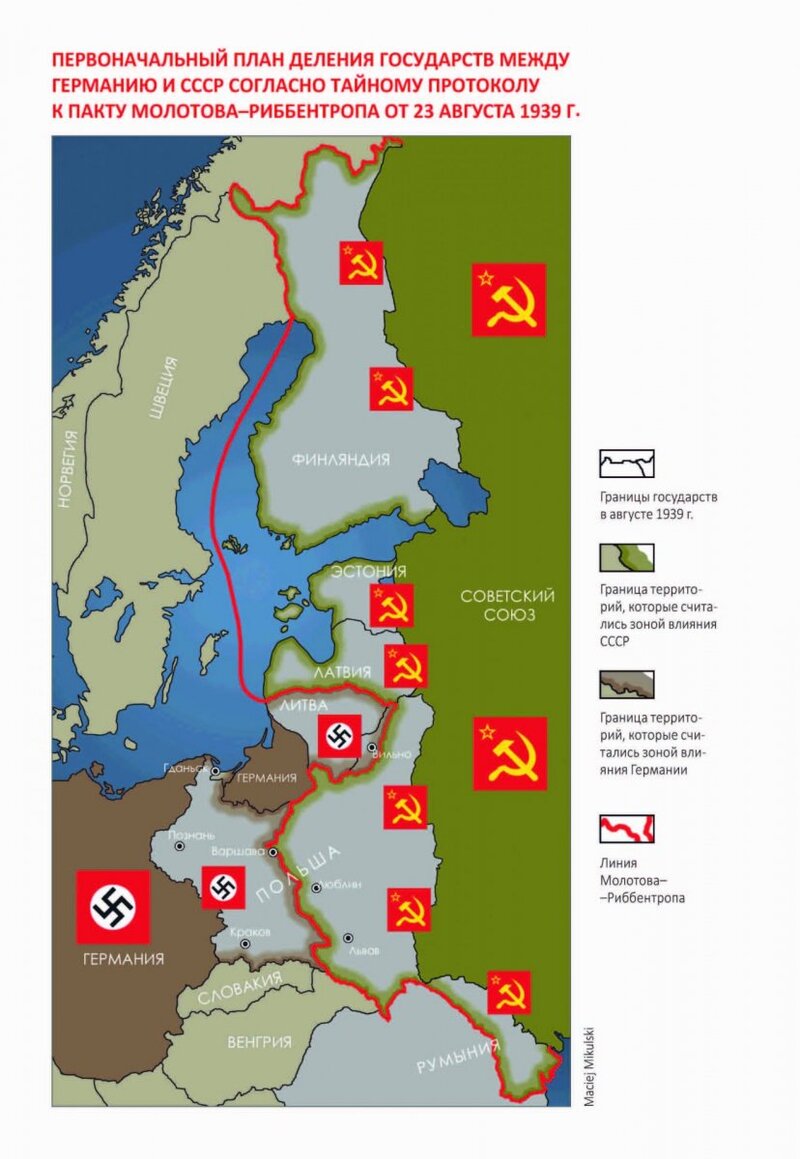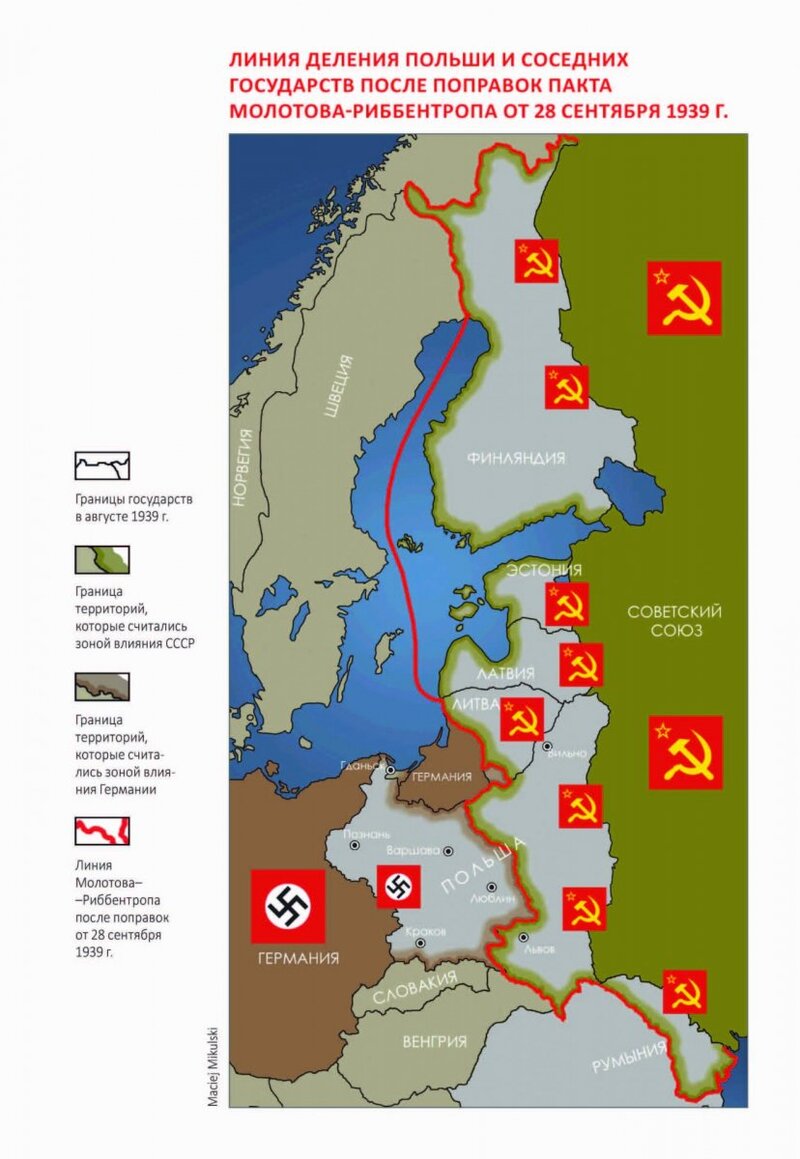Заявление Института национальной памяти в связи с высказываниями Президента Российской Федерации о Второй мировой войне и ее причинах
И Германия Гитлера, и Советский Союз Ленина и Сталина целенаправленно стремились разрушить установленный согласно Версальскому договору порядок в Европе и навязать свой порядок другим европейским народам. Вторая мировая война началась с нападения Германии и Советского Союза на Польшу в 1939 г. Ее очередным актом было нападение обеих тоталитарных империй на соседние государства на востоке и на западе континента.
Военной агрессии Германского Рейха и СССР предшествовало взаимное соглашение от 23.08.1939 г., известное как пакт Молотова-Риббентропа. Лишь в официальной части этот документ представлялся как договор о ненападении. Название «договор о ненападении» должно было ввести в заблуждение мировое сообщество, создавая видимость такого рода соглашений, которые заключались в Европе. Истинные намерения двух агрессоров были представлены в секретном протоколе, который прилагался к пакту и содержал положения о разделе сфер влияний, ориентированные на захват территорий независимых государств: Польши, Литвы, Латвии, Эстонии, Финляндии и Румынии. Именно секретный протокол делает из этого соглашения документ, являвшийся основанием для военной агрессии обоих государств с сентября 1939 г.
Результатом пакта Молотова-Риббентропа стало сотрудничество и координация советско-германских действий во время нападения этих государств на Польшу в сентябре 1939 г. Немцы, начавшие военные действия 1 сентября 1939 г., получали подробную информацию от СССР о подготовке вооруженного вторжения СССР в Польшу. «Молотов вызвал меня сегодня в 16 часов и заявил, что Красная Армия была приведена в боевую готовность быстрее, чем ожидалось. Поэтому советские военные действия могут начаться раньше […]. Молотов просит, чтобы ему сообщили как можно точнее, когда можно рассчитывать на захват [немцами] Варшавы», – сообщал посол Рейха в Москве в депеше главе германского МИД Иоахиму фон Риббентропу от 14 сентября 1939 г. Гитлера через германского посла в Москве информировали не только о сроках нападения СССР на Польшу, но и о том, каким образом оно будет обосновано официальной пропагандой в мире. «Молотов заявил, что вооруженное вторжение Советского Союза состоится, вероятно, завтра или послезавтра. Сталин […] назовет мне день и точное время советского наступления. […] Советское правительство намерено обосновать свои действия следующим образом: польское государство распалось и больше не существует […] Советский Союз считает своим долгом вмешаться с целью защиты своих украинских и белорусских братьев […], – сообщал посол Рейха в Москве главе германского МИД Иоахиму фон Риббентропу 16 сентября 1939 г. 17 сентября 1939 г., когда сотни тысяч советских солдат вторглись с востока в Польшу, сражавшуюся очередную неделю с Германией в одиночку, посол Рейха в Москве рапортовал: «Сталин в присутствии Молотова и Ворошилова принял меня в два часа ночи и заявил, что Красная Армия пересечет сегодня утром советскую границу на всей протяженности от Полоцка до Каменца-Подольского».
Вооруженное вторжение Советского Союза помогло Германии быстрее сломить сопротивление и разбить польскую армию. В результате совместных действий с Гитлером Советский Союз захватил более половины довоенной территории Польской Республики. Оба тоталитарных оккупанта немедленно приступили к уничтожению людей и государственных структур.
Очередным актом советской агрессии, предусмотренным пактом Молотова-Риббентропа, было начавшееся в ноябре 1939 г. нападение СССР на Финляндию. Компрометирующий способ ведения действий и героизм финских солдат уберегли эту страну от полного включения в состав СССР (однако Финляндия утратила пограничные территории). В 1940 г. Советский Союз произвел жесткую аннексию прибалтийских государств (Литвы, Латвии и Эстонии), а также аннексию румынской Бессарабии и северной части Буковины. Этот имперский захват территорий должен был стать прелюдией к дальнейшей экспансии СССР и коммунизма. Одновременно Советский Союз поддерживал поставками сырья военные действия Германии на западе и на севере континента на протяжении 1940 г.
В период тесного сотрудничества в 1939–1941 гг. Германия и Советский Союз проводили политику жестокого террора в отношении миллионов граждан Польской Республики. В восточной части оккупированной страны проводимые советскими органами аресты, депортации, убийства и массовые расстрелы касались не только поляков, но и национальных меньшинств (в том числе евреев – также тех, кто искал на востоке спасения от насилия германского государства). Одним из наиболее показательных символов советской жестокости и террора в этот период является Катынский расстрел. В это время имела место взаимная координация некоторых репрессивных действий между НКВД и гестапо.
В 1941 г., после периода тесного сотрудничества с Гитлером, СССР сам стал объектом нападения и только после этого стал врагом Германского Рейха.
Вся Польша тогда оказалась под германской оккупацией. Несмотря на преступные плоды советской оккупации, находившиеся в изгнании власти Польской Республики пытались наладить с Советским Союзом отношения, основанные на взаимном уважении суверенитета и границ. Пока советские войска терпели поражение на фронте, СССР поддерживал дипломатические отношения с Польшей – несмотря на саботирование взаимодействия со стороны Сталина (напр., переброска и консолидация коммунистических диверсий в центральной Польше). После Сталинградской битвы Сталин вернулся непосредственно к политике имперских завоеваний. Он целенаправленно обострял двусторонние отношения, чтобы в конце апреля 1943 г. разорвать отношения с Польшей. Пользуясь уступчивостью западных государств, в 1944–1945 гг. он привел к включению в состав СССР восточных воеводств Польской Республики и порабощению остальной части страны. Это случилось, несмотря на то, что Польша с первых и до последних дней войны самоотверженно участвовала в создании коалиции союзников и сражалась против Германского Рейха.
Сталин не позволил восстановить независимое польское государство, заблокировал возможность возращения в страну из изгнания законных властей Польской Республики, приступил к жестокому уничтожению людей и структур Подпольного польского государства. После захвата польских земель Красной Армией в 1944–1945 они по-прежнему были местом совершаемых советскими и коммунистическими органами жестоких преступлений, массовых арестов и депортаций в глубь СССР. Польское общество оставалось порабощенным под советским ярмом и под правлением поддерживаемого Москвой коммунистического режима следующие десятилетия. Независимость, после периода советского порабощения, Польша стала возрождать лишь после 1989 г. Оккупационные советские гарнизоны покинули нашу страну (уже как российские войска) лишь в 1993 г.
В 1938 г. в Мюнхенской конференции, наравне с Германией и Италией, приняли участие Франция и Великобитания. Западные государства приняли территориальные претензии Гитлера к Чехословакии. Эта конференция не добавила славы двум западным демократиям. Они за счет территории другой страны пытались удовлетворить германское чудовище, рассчитывая на то, что таким образом спасут мир. История показала, как сильно они заблуждались. Однако сравнение этой недостойной конференции с пактом Молотова-Риббентропа, в котором оба тоталитарных участника разделили между собой территории многих свободных государств континента, не выдерживает проверки фактами. В Мюнхене только Германии был открыт путь к новым завоеваниям. В пакте Молотова-Риббентропа оба государства делили между собой территории многих государств континента. При этом масштабы предусмотренных этим пактом территориальных завоеваний Советского Союза превышали даже то, что должен был получить Рейх Адольфа Гитлера.
Польша не участвовала в Мюнхенской конференции в 1938 г. Сравнение, далекое от корректности, польско-чехословацких отношений в 1918–1938 гг. с проводимой Советским Союзом имперской политикой уничтожения независимых государств и порабощения других народов свидетельствует о невежестве или осознанном желании манипулировать фактами.
Тоталитарный Советский Союз во время Второй мировой войны и после ее окончания совершал как преступления против мира, так и военные преступления, и преступления против человечности. Попытки поставить под сомнение очевидные факты о роли Советского Союза в начале Второй мировой войны и совершаемых им массовых убийствах, в том числе геноциде, оскорбляют память жертв этих преступлений.
Через несколько месяцев мы будем вспоминать 80-ю годовщину совершенного Советским Союзом в 1940 г. Катынского расстрела. На протяжении многих десятилетий советские виновники, как и их преемники, официально заявляли, что это преступление совершило другое государство. В 1943 г. Советский Союз изображал непричастность и возмущение, когда его массовые убийства были раскрыты и названы своими именами. Пропагандистская ложь использовалась им настолько масштабно, что раскрытие Катынского расстрела стало причиной разрыва отношений с нашим государством. Он также использовал это в антигитлеровской коалиции для массированной и медийной атаки на Польшу – родину тех тысяч граждан, которых в Катыни и других местах убивали советские органы.
Сейчас российская пропаганда берет пример с худших проявлений эпохи сталинизма.
